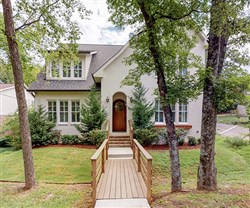VOL. 46 | NO. 38 | Friday, September 23, 2022
Who knew real estate prices were going to rise this high?

2008 Natchez Trace
If only homebuilders – and the rest of us – had crystal balls. Builders who were completing construction on homes in 2020 were thrilled to have finally finished the homes they began in 2019 before the dawning of the age of COVID. They had weathered lockdowns, shutdowns, labor shortages and a fear of the unknown.
Little did they know Nashville was about to hitch its wagon to a real estate steed that would lead the city on wildest-ever real estate ride. Had homebuilders like AE Construction’s Adam Epstein known that the house he built at 2008 Natchez Trace and sold for $1.225 million in March 2020 would sell for $1,737,500 slightly more than two years later, perhaps he would have rented it during that time.
He would have made more money than building another home. However, Epstein, like other builders, is accustomed to the ebbs and flows of the market and manages to look forward rather than cry over spilled nails.
Known for the quality of his construction, the 2008 Natchez Trace house sold six days after Shannon FitzGerald, one of the superstars with Keller Williams, listed it.
FitzGerald – now a brand rather than a typo – was quite familiar with the home, having sold it to the current owner two years ago. She described the residence as a “gorgeous modern farmhouse,” adding the property includes the “most adorable carriage house over the two-car garage, which is ready for our electric vehicle.”
She noted that the home has an open concept and a “HUGE” bonus room. The new owners, she added, could, “sip coffee on the peaceful screened porch.” All Epstein trademarks. The house includes 4,500 square feet with five bedrooms and five full bathrooms.
Caroline Dean, a name that often appears on sales of this size in this area, represented the buyer for this beautifully crafted home. Caroline is with VILLAGE and sells numerous homes in the Hillsboro Village area, as well as other parts of town.
The seller had bought during the time when the market was shifting, and the price this sale garnered his sale speaks to home values pre-COVID and post-COVID. Well-built, Epstein-like homes in good areas seem to appreciate in Nashville regardless of national trends.
Selling for $1,225,000 in 2020 and $1,737,500 provided a gross profit of $512,000. It behooves builders to have stories of appreciation on their products, but there has to be the question of “what if I had held it?” flowing through Epstein’s mind as visions of dollar signs dance in his 2018 head.
Some buyers prefer new construction rather than previously owned homes, and with the recent surge in teardowns and development of the lots formerly known as small houses, there are more new houses than ever before.
In the case of 2008 Natchez Trace, Epstein bought the lot for $382,500 in August 2017, began construction in 2018 and completed the home in 2020. His sale price of $1,225,000 less the acquisition cost of $382,500 plus closing costs – which could run $7,500 – made for a total investment of $390,000 leaving $835,000.
Many sales cost as much as 7% to close and – at the $1.25 million sales price – that total would be $85,750, which would come off the bottom line, leaving him $749,250 to build a house and, hopefully, profit. That does not account for property taxes, insurance, utilities and interest.
It is doubtful that anyone could build that house for that money today, hence the appreciation. Caroline Dean’s clients bought a house for less than it could be built today, and the seller made more money than Epstein could have possibly pocketed with the original sale. In most cases of a builder buying a teardown and constructing one single-family home, there is a great value in the property.
Stone Oak Builders and their real estate broker, Richard Bryan, have taken this philosophy to a higher level, buying lots for as much as $2 million and selling for as much as $5.7 million.
In the case of 1018 Stonewall Drive, Stone Oak bought a property for $850,000 and built a home that sold for $2.8 million in 2020.
The buyer turned seller sold the house for $6.5 million two years and two days later.
From a tax perspective, holding the home for two years drops the taxable income from 40% to 20%, and therefore a number of the 2020 purchases are being held for at least two years, thereby reducing the tax by 50%.
Richard Courtney is a licensed real estate broker with Fridrich and Clark Realty, LLC, and can be reached at [email protected].